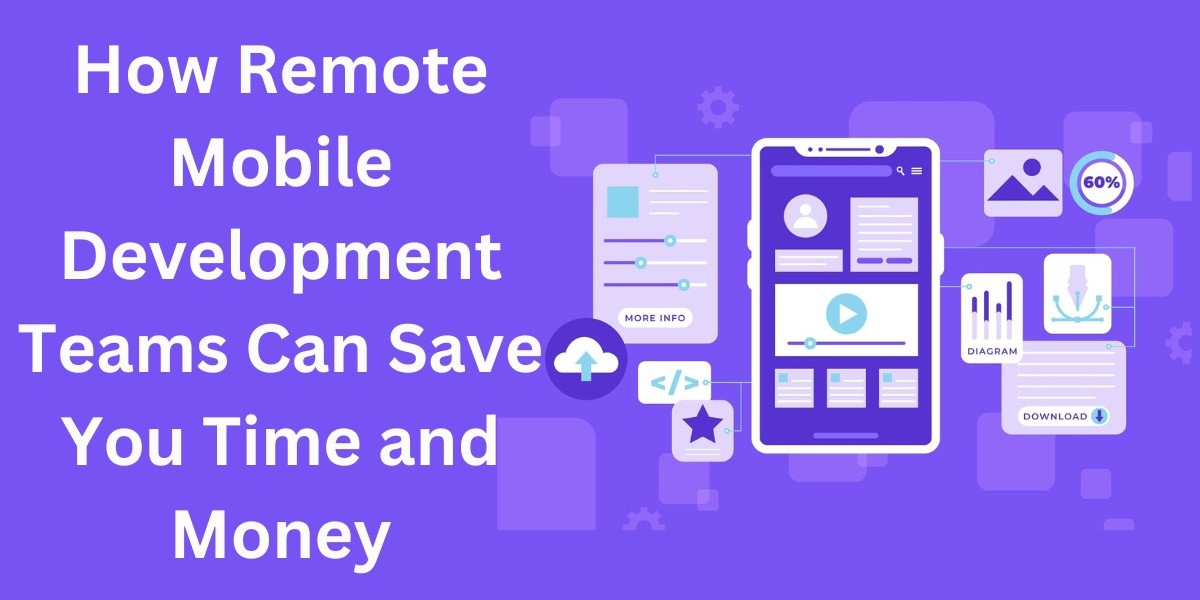In today’s fast-paced, tech-driven world, companies are constantly on the lookout for ways to develop cutting-edge mobile apps faster, more efficiently, and on budget. But with increasing demands for innovative features, seamless user experiences, and tight deadlines, the question arises: how can businesses achieve all of this without stretching their budgets thin? The answer is simpler than you might think: remote mobile development teams.
Remote teams—especially when they’re made up of highly skilled professionals—are transforming the way companies approach mobile app development. By embracing the power of remote work, businesses are not only able to save valuable time but also slash their development costs significantly.
But how exactly do remote teams make such a difference? Let's break it down.
The Traditional Development Model: A Recipe for Overhead
Before we explore how remote teams can save you time and money, let’s quickly touch on the traditional model of app development.
Most companies, especially startups, have long relied on in-house teams or local agencies to handle their mobile app development. While this model provides some advantages—like direct communication and easier management—it comes with its fair share of drawbacks.
The Hidden Costs of Local Development
High Salaries: Hiring local developers, especially in tech hubs like Silicon Valley or major metropolitan cities, comes at a hefty price. The costs of recruiting, salaries, benefits, and office overhead can quickly skyrocket.
Time-Consuming Recruitment: Finding the right talent in a competitive local market takes time—often months. Startups especially can’t afford to waste time when they’re trying to stay ahead of competitors.
Limited Talent Pool: You’re limited to the developers within your geographical location. This might not be a problem in tech-dense cities, but for others, finding the right skill set can be like finding a needle in a haystack.
Is There a Better Way?
Enter the world of remote mobile development teams.
By tapping into global talent, businesses can enjoy high-quality mobile app development without the hefty overhead or recruitment headaches. And, as remote work continues to gain momentum, the benefits of remote development teams are becoming even more pronounced.
1. Reduced Development Costs
One of the most immediate and significant advantages of working with remote mobile development teams is the cost savings.
Lower Labor Costs: Access to Global Talent at Lower Rates
When you hire developers from regions with a lower cost of living, you often pay significantly lower hourly rates or project fees. A developer in Eastern Europe or Asia might provide the same expertise as one from a high-cost city like New York or San Francisco, but at a fraction of the cost.
For example:
- Developers in the U.S. or Western Europe can command hourly rates ranging from $50 to $150 or more.
- In contrast, developers in regions like South Asia, Eastern Europe, or Latin America may charge $25 to $60 an hour, with little-to-no sacrifice in quality.
For startups or smaller companies with tight budgets, this presents a huge opportunity. By outsourcing development to remote teams, you can ensure that the project is completed without breaking the bank, all while maintaining high standards.
More Affordable Operational Costs
Beyond the salaries themselves, remote teams help you save on operational costs such as:
- Office space: No need to lease or maintain a physical office.
- Equipment: Remote developers typically provide their own hardware and software, so you don’t need to invest in costly workstations or licenses.
- Utilities: No electricity, internet, or other office-related expenses to worry about.
2. Faster Time to Market
Time is money in the tech world, and when it comes to mobile app development, speed is everything. A delayed app launch could mean losing out on potential customers or getting outpaced by competitors.
Remote teams are an excellent way to accelerate the development timeline, and here’s how they do it:
A 24/7 Development Cycle
With remote teams working across multiple time zones, your project never really stops. If one part of your team is clocking off for the day, another team can pick up right where they left off. This 24/7 workflow results in faster turnaround times and can drastically shorten your app development lifecycle.
Let’s say you’re working with a team across the U.S. and India. While your U.S. developers are wrapping up for the evening, your Indian team is just starting their day, keeping your app development process moving forward without interruption.
Agile Development
Remote teams often embrace Agile methodologies, which prioritize continuous collaboration, iteration, and flexibility. Agile practices allow developers to focus on delivering small, incremental updates, quickly testing them, and adjusting based on feedback. This leads to faster releases, more efficient bug fixes, and a smoother overall development process.
3. Access to a Global Talent Pool
The quality of developers you have access to plays a pivotal role in the success of your mobile app. Local teams may have a limited skill set or expertise, while global talent can provide a much wider range of experiences and specializations.
Find the Best Talent
By working with remote teams, you open up access to a talent pool far larger than any local market could provide. Whether you need experts in iOS development, Android development, or specialized areas like UI/UX design, machine learning, or AR/VR, there are skilled developers across the globe ready to work on your project.
In addition, working remotely allows you to find developers who have experience building apps for a wide variety of industries. From fintech to healthcare, education, or e-commerce, international developers bring diverse insights and experience that can elevate the quality of your app.
4. Greater Flexibility and Scalability
In the world of mobile app development, flexibility is crucial. Your business needs can change rapidly, and sometimes the demands of your app require you to scale your team quickly. Whether you need more developers for a complex feature or need to speed up development as your launch date nears, remote teams give you the flexibility to scale up or down as needed.
Easy Scaling
With a remote team, you don’t have to go through the process of hiring additional full-time employees or extending contracts. You can simply bring in more developers for specific tasks, certain time frames, or phases of the project. And when the job is done, you can easily scale back down, keeping costs under control.
This flexibility is particularly valuable for startups or businesses working with limited budgets. It allows you to pay for the resources you need when you need them, without committing to long-term contracts or dealing with the logistics of on-site staffing.
5. Reduced Risk of Burnout
Remote teams often operate under the understanding that work-life balance is key to productivity. When working with local developers, especially in high-pressure startup environments, burnout is a common issue. The constant hustle and long hours can lead to a drop in the quality of work and a delay in project timelines.
Fresh Perspectives, Better Focus
Remote teams tend to have more flexible work hours, better overall work-life balance, and, in many cases, the ability to work from locations that inspire creativity. A remote team’s structure can allow for focused, uninterrupted work, leading to a higher quality of output.
Additionally, you’re more likely to get fresh ideas and solutions from a team that’s geographically and culturally diverse, ensuring your project benefits from varied experiences and perspectives.
6. Focus on Core Business Activities
When your mobile app development is handled by an external remote team, you free up valuable resources to focus on your business's core activities. Instead of managing developers, troubleshooting issues, or dealing with technical challenges, you can concentrate on other important aspects of your business such as marketing, customer engagement, or business development.
By delegating the technical side of things to remote experts, you can make better strategic decisions that drive business growth.
7. Communication Tools and Collaboration Are Better Than Ever
Gone are the days when remote work meant time zone confusion and communication barriers. Today, a wide range of tools and platforms make collaboration between remote teams and local businesses smooth and efficient.
Tools for Seamless Communication:
- Slack, Trello, Asana, and Jira keep everyone on the same page, no matter where they are.
- Zoom and Microsoft Teams make video calls and meetings feel almost as good as face-to-face interactions.
- GitHub and Bitbucket facilitate code sharing, version control, and team collaboration on a global scale.
These tools ensure transparency, real-time collaboration, and that every team member is always in the loop. With clear communication channels, misunderstandings and delays can be minimized, further boosting the efficiency of remote teams.
Conclusion
Working with remote mobile development teams is no longer just a passing trend—it’s a powerful business strategy. Whether you’re looking to save money, speed up your development cycle, or tap into a broader talent pool, the benefits are undeniable.
By utilizing remote teams, businesses can create high-quality mobile apps, stay within budget, and launch products faster than ever before. And as remote work continues to reshape the way we do business, partnering with mobile app developers in Atlanta might just be the smartest move you can make for the future of your startup.
So, if you’re based in Atlanta or anywhere else and looking to collaborate with a talented mobile app development team, don’t hesitate to explore the possibilities remote teams offer. The right experts are just a click away.



